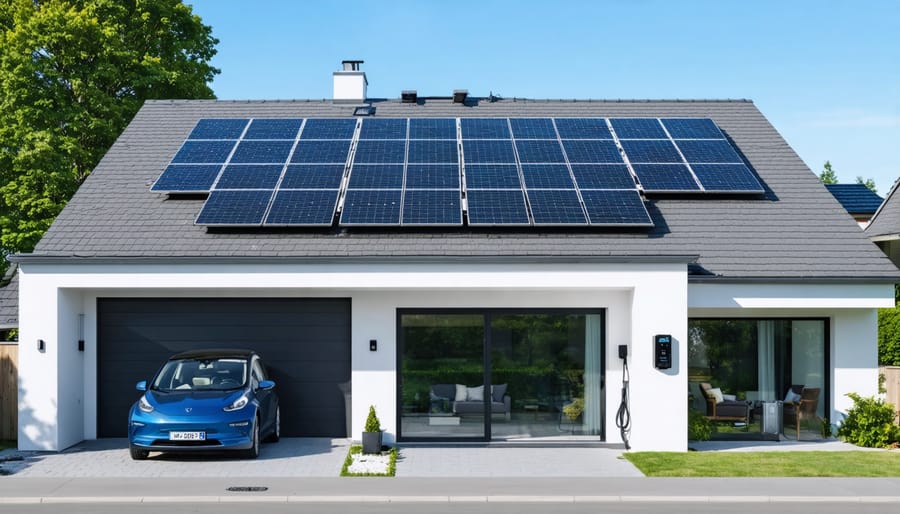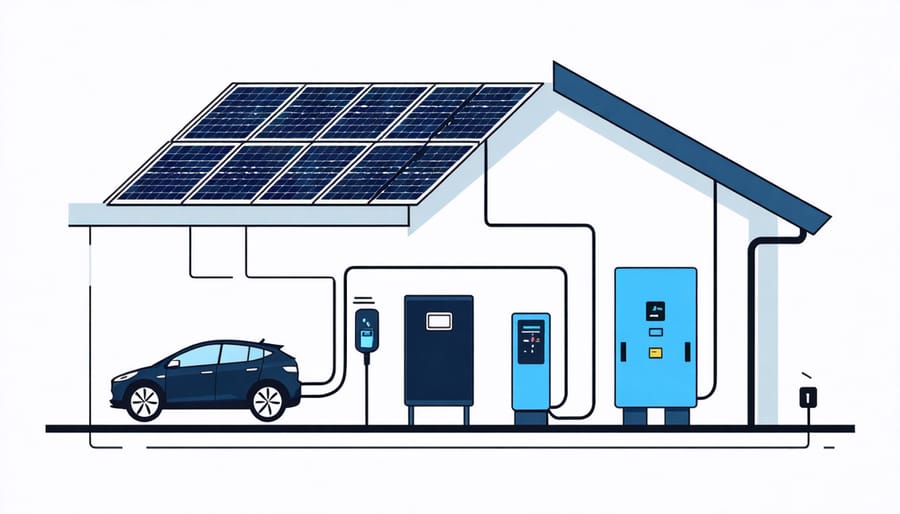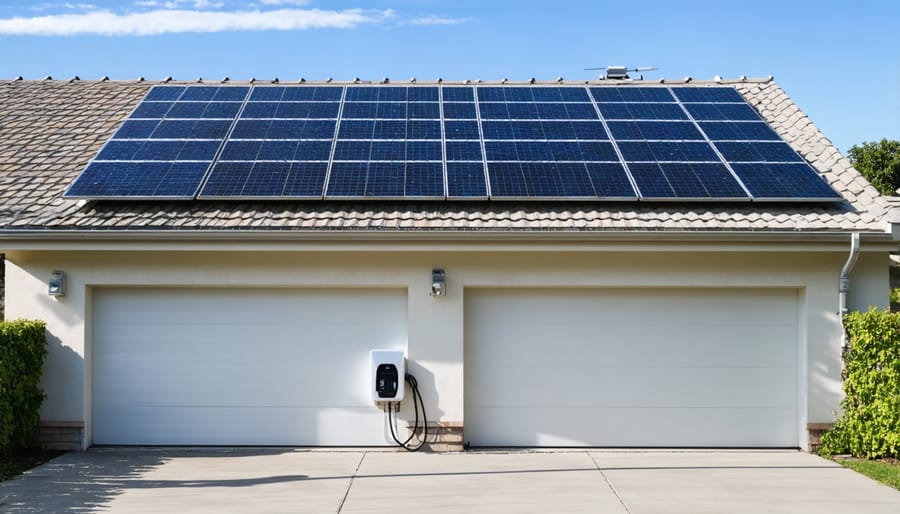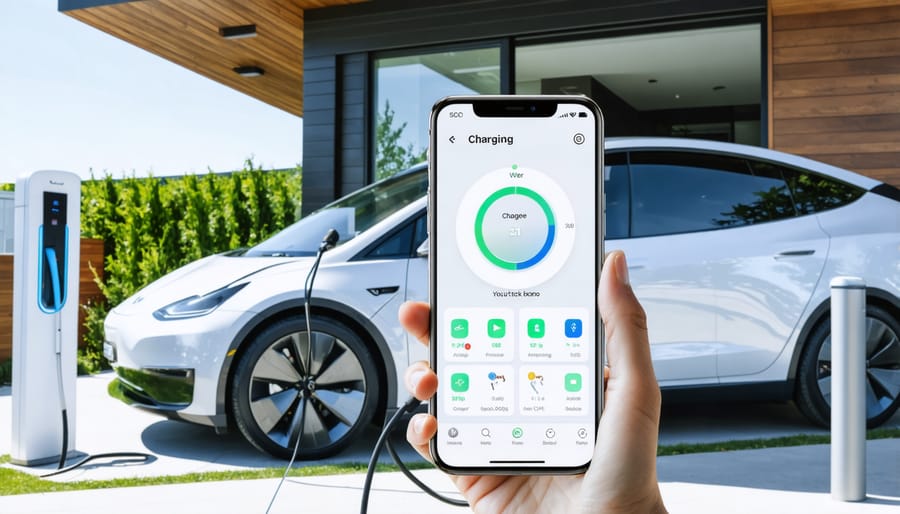Solar-Powered EV Charging at Home: The Perfect Energy Partnership

Transform your home into a sustainable energy hub with residential EV charging stations – the essential link between clean transportation and renewable power. As electric vehicles reshape European mobility, installing a home charging solution has become a strategic investment that combines convenience with environmental responsibility.
Modern residential EV chargers do more than just power vehicles; they integrate seamlessly with solar systems and smart home technology to optimize energy consumption and reduce electricity costs. With charging speeds up to 22kW for home installations, these systems can fully charge most electric vehicles overnight while taking advantage of lower off-peak electricity rates.
For European homeowners, the transition to electric mobility represents a significant step toward energy independence. Whether you’re installing your first EV charger or upgrading an existing system to work with solar panels, today’s residential charging solutions offer sophisticated energy management features that balance vehicle charging with household power needs and solar generation.
This comprehensive guide explores the technical specifications, installation requirements, and smart features of residential EV charging stations, helping you make an informed decision about the right charging solution for your home and lifestyle.
Understanding Solar-Powered EV Charging Systems
Essential Components
A residential EV charging station comprises several key components working together to deliver safe and efficient charging for your electric vehicle. The heart of the system is the charging unit itself, which comes in different power levels suitable for home use, typically ranging from 3.7kW to 22kW. These units feature robust weatherproof housings and smart connectivity options for remote monitoring and control.
The electrical infrastructure includes a dedicated circuit breaker in your home’s distribution board, heavy-duty cabling rated for continuous high-current operation, and proper grounding systems to ensure safety. Modern charging stations incorporate sophisticated power management systems that can automatically adjust charging rates based on your home’s energy consumption patterns.
Essential safety features include residual current protection, surge protection devices, and emergency stop functions. Many units also feature built-in temperature monitoring and overload protection to prevent any electrical issues during charging sessions.
For smart charging capabilities, the system includes a communication module that enables features like scheduled charging, energy consumption tracking, and integration with home energy management systems. A user interface, either through a smartphone app or built-in display, provides real-time information about charging status, energy consumption, and system health.
Optional but valuable components include load balancing systems to manage power distribution between multiple charging points and energy meters for precise consumption monitoring. These components ensure optimal performance while maintaining the safety and efficiency of your home’s electrical system.

Integration with Home Energy Systems
Modern EV charging stations can seamlessly integrate with home solar storage solutions and smart home technology, creating an efficient energy ecosystem. When connected to a solar PV system, your charging station can prioritise renewable energy for charging your vehicle, significantly reducing both electricity costs and carbon footprint.
Smart integration allows homeowners to schedule charging during peak solar production hours or when electricity rates are lowest. Advanced energy management systems can automatically balance power distribution between household consumption, EV charging, and battery storage, ensuring optimal energy usage throughout the day.
Many modern charging stations feature bi-directional charging capabilities, enabling vehicle-to-home (V2H) functionality. This innovation allows your EV’s battery to serve as an additional power source during outages or high demand periods, enhancing your home’s energy independence.
Compatible smart home platforms can control charging schedules, monitor energy consumption, and adjust charging speeds through smartphone apps or home automation systems, offering convenience and enhanced energy efficiency.
Planning Your Solar EV Charging Station
System Sizing and Power Requirements
Proper system sizing for your EV charging station is crucial to maximize your home’s solar potential and ensure efficient vehicle charging. The power requirements primarily depend on your vehicle’s battery capacity and daily driving needs. Most modern EVs have batteries ranging from 40 kWh to 100 kWh, requiring different charging solutions.
For typical residential installations, Level 2 AC charging stations operating at 7.4 kW (32A) or 11 kW (16A three-phase) are ideal. These systems can fully charge most EVs overnight, providing approximately 35-50 kilometers of range per hour of charging. For households with multiple EVs or higher daily mileage requirements, consider installing a more powerful 22 kW charging station.
To calculate your specific needs, multiply your average daily driving distance by your vehicle’s energy consumption (typically 15-20 kWh per 100 km). Add a 20% buffer for charging losses and unexpected trips. For example, if you drive 50 km daily in a vehicle consuming 18 kWh/100 km, you’ll need approximately 11 kWh of charging capacity daily.
Consider your home’s electrical capacity when selecting a charging station. Most European homes with three-phase power can accommodate 11 kW charging stations without major electrical upgrades. However, installation of higher-powered units may require assessment by a qualified electrician to ensure your domestic supply can handle the additional load.
Installation Requirements and Considerations
Installing a residential EV charging station requires careful planning and consideration of several technical aspects. First, your property must have adequate electrical capacity to support the charging station. Most modern homes in Europe require a three-phase connection with at least 400V supply and dedicated circuit protection.
Professional installation by a certified electrician is mandatory to ensure compliance with local regulations and safety standards. Before installation, you’ll need to obtain necessary permits from your local authority and possibly your electricity network operator. The installation must comply with IEC 61851 standards for EV charging systems and local building codes.
The optimal location for your charging station should be easily accessible, protected from weather elements, and close to where you typically park your vehicle. Consider the cable length requirements and ensure the station doesn’t obstruct pathways or create tripping hazards. Wall-mounted units are popular for residential installations, but pedestal options are available for locations far from structures.
Key technical requirements include:
– Minimum 32A dedicated circuit
– Type 2 socket (standard in Europe)
– RCD Type B protection
– IP54 rating for outdoor installation
– Smart meter compatibility for energy monitoring
Your charging station should also have adequate ventilation and be positioned away from heat sources. Future-proofing your installation by choosing a higher power rating than currently needed can save costs in the long term, especially as EV battery capacities continue to increase.

Cost and Savings Analysis
Initial Investment and Installation Costs
The investment in a residential EV charging station typically ranges from €500 to €2,500 for the equipment alone, with costs varying based on charging speed and smart features. When considering installation, homeowners should budget an additional €300 to €1,000 for professional electrical work. This installation cost can be optimised when combined with solar installation costs and returns, as both systems can share certain electrical infrastructure.
Key cost factors include the charging power level (3.7kW to 22kW), smart connectivity features, and existing electrical infrastructure. Basic wall-mounted units start at €500, while advanced models with load balancing and smartphone integration can reach €2,500. Installation costs depend on your home’s electrical capacity, distance from the main panel, and whether upgrades to your electrical system are needed.
Many European countries offer incentives and tax rebates for EV charging installations, potentially reducing the total investment by 20-50%. It’s worth noting that some regions require specific certifications for both equipment and installers, which should be factored into the overall budget.
Long-term Savings and ROI
Installing a residential EV charging station represents a significant long-term investment that typically delivers substantial returns through multiple channels. Most EV owners recover their initial investment within 3-5 years through reduced fuel costs alone, with savings ranging from €500 to €1,500 annually compared to conventional fuel expenses.
The economic benefits become even more attractive when combined with solar power systems. By charging your EV using self-generated solar electricity, you can reduce your charging costs by up to 80% compared to standard grid electricity rates. This integration also provides protection against rising energy prices, ensuring predictable charging costs for years to come.
Several European countries offer generous incentives for residential EV charging installations. These include tax credits, direct subsidies, and installation grants that can cover up to 50% of the total system cost. For instance, Germany’s KfW programme offers up to €900 for private charging points, while France provides tax credits of up to €300 for installation costs.
Additional value comes from increased property value, with studies showing that homes equipped with EV charging stations command a premium of 2-5% in the European market. When considering maintenance costs, modern charging stations require minimal upkeep, typically limited to occasional software updates and basic inspections, further enhancing their long-term cost-effectiveness.
Smart charging features can also optimise charging times to take advantage of lower electricity rates, potentially saving an additional €200-300 annually through strategic energy consumption.
Smart Features and Future-Proofing
Smart Charging Capabilities
Modern residential EV charging stations have evolved beyond simple power delivery, incorporating intelligent features that optimize charging efficiency and reduce energy costs. At the heart of these advanced capabilities is a smart energy management system that monitors and controls charging sessions based on various parameters.
These charging stations can automatically adjust charging rates based on household electricity consumption, solar production, and grid demand. During peak solar generation hours, the system prioritizes using solar power for charging, maximizing self-consumption and reducing grid dependency. When connected to dynamic electricity tariffs, smart chargers can schedule charging sessions during off-peak hours, resulting in significant cost savings.
Many modern units offer smartphone connectivity through dedicated apps, allowing users to monitor charging status, track energy consumption, and adjust settings remotely. Some advanced models even integrate with home automation systems, enabling coordinated energy management across all household devices.
Load balancing is another crucial feature, preventing circuit overload by automatically adjusting charging power based on other electrical loads in the home. This ensures safe operation without requiring expensive electrical upgrades.
For homes with solar installations, smart charging stations can optimize charging patterns based on weather forecasts and historical solar production data. This predictive capability ensures maximum utilization of renewable energy while maintaining charging reliability.
The latest models also support vehicle-to-home (V2H) functionality, allowing the EV battery to serve as backup power during outages or to optimize household energy consumption during peak demand periods, creating a more resilient and efficient home energy ecosystem.

Future Technologies and Upgradability
The EV charging landscape is rapidly evolving, and today’s residential charging installations must be ready for tomorrow’s innovations. Smart charging capabilities are becoming increasingly sophisticated, with new systems offering advanced load management, automated scheduling, and integration with home energy management systems.
Bidirectional charging technology (V2G – Vehicle to Grid) is emerging as a game-changing feature, allowing EVs to not only consume but also feed energy back into the home or grid. This technology is particularly relevant for European households with solar installations, as it enables EVs to serve as mobile energy storage units, enhancing overall energy independence.
Future-proof installations should consider upgradeable power outputs, as newer EV models are continuously improving their charging capabilities. Modern charging stations often feature over-the-air software updates, ensuring compatibility with emerging protocols and security standards without requiring hardware replacement.
Wireless charging is another promising technology on the horizon. While currently in development, preparing the installation space for potential wireless charging integration could be beneficial for long-term planning. Similarly, artificial intelligence-driven charging optimization is becoming more prevalent, helping users maximize cost savings and reduce grid impact.
When installing a residential charging station today, it’s advisable to choose systems with modular designs that allow for easy hardware upgrades. Consider installing additional conduit and ensuring the electrical infrastructure can support higher power demands in the future. European regulations are also evolving to support smart charging features, making compliance-ready systems increasingly important.
Connectivity standards are continuously improving, with newer protocols enabling better communication between vehicles, chargers, and energy management systems. Investing in charging stations that support multiple communication standards helps ensure long-term compatibility with future innovations.
The transition to electric vehicles represents a pivotal moment in our journey towards sustainable transportation, and residential EV charging stations are at the heart of this transformation. By installing a home charging solution, homeowners not only contribute to reducing carbon emissions but also enjoy unprecedented convenience and cost savings in their daily lives.
The integration of EV charging stations with residential solar systems creates a powerful synergy that maximises environmental benefits while minimising energy costs. This combination represents a comprehensive approach to sustainable living, offering independence from traditional energy sources and protection against rising electricity prices.
As Europe continues to lead the way in renewable energy adoption, the installation of residential EV charging infrastructure has never been more relevant or accessible. With improving technology, decreasing installation costs, and generous government incentives across many European countries, now is the ideal time to invest in this future-proof solution.
By taking action today and installing a residential EV charging station, you’re not just preparing your home for the inevitable shift to electric mobility – you’re actively participating in the creation of a cleaner, more sustainable energy landscape for future generations. The benefits extend beyond individual convenience to contribute to broader community goals of reduced emissions and enhanced energy independence.
Let’s embrace this opportunity to transform our homes into energy-efficient hubs that support the green transport revolution while securing long-term financial and environmental advantages.
Leave a Reply